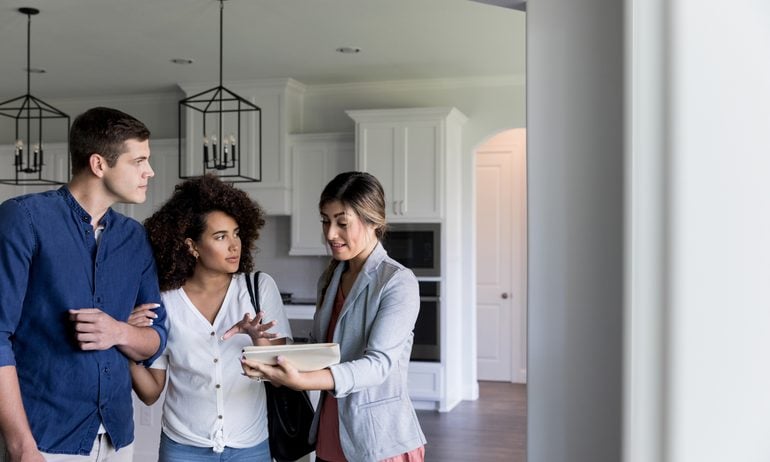What to Look for When Buying a House: A Buyer’s Guide
Location, features and condition are key considerations when buying a house.

Some or all of the mortgage lenders featured on our site are advertising partners of NerdWallet, but this does not influence our evaluations, lender star ratings or the order in which lenders are listed on the page. Our opinions are our own. Here is a list of our partners.
First, determine your price range. Wait to list your “must-haves” until you know what you can afford.
You can’t change a house’s location. Consider safety, schools, amenities and proximity to family and friends.
A house's layout matters as much as its square footage. And don’t skip the home inspection.
Expect to compromise, especially in a hot market. Your first house might not check every box, and that’s OK.
Your lifestyle and future plans play a big role in what to look for when buying a house. Here’s a list of criteria to consider when starting your house hunt.
Price
Your first step: Determine a price range. With that in mind, you’ll have a sense of which “must-have” features are realistic for your budget. NerdWallet's home affordability calculator can help you figure out how much house you can afford.
To figure out an affordable monthly payment, try the 28/36 rule: You shouldn’t spend more than 28% of your gross monthly income on housing costs and 36% on total debts, which include your mortgage and other payments, like credit cards and loans.
Avoid the temptation to stretch your budget (or your down payment amount) beyond what’s comfortable. Leave some wiggle room in your homebuying budget to account for one-time costs, like closing costs and moving expenses.
Your first house probably won’t check every box, and that’s OK. You can tackle small projects along the way to customize the place to your liking. If done right, those improvements can build home equity, too.
Location
Once you know your price range, figure out which areas are affordable for you to buy in. Location is often a top priority for home buyers because it affects aspects of daily life, including the commute to work and options for shopping and dining out. And while you can change the look and size of a house, you can’t change its location.
Here are some important aspects to consider:
Neighborhood: Visit the neighborhood at different times of the day to get a feel for activity in the area. Are the properties well-maintained? Is there excessive noise? Take a peek at online communities, neighborhood groups and crime maps. Even better: Talk to some locals about what it’s like living there.
Convenience: Think about your typical errands and go-to communities. Is the home close to grocery stores, restaurants, gyms, places of worship or other important gathering spaces?
Schools: Even if you don’t have children, the quality of nearby schools is something to look at when buying a house. Homes in neighborhoods with better schools hold a stronger resale value.
Commute: How busy is rush hour? Are you close to major highways, bus stops or train stations? Whether you drive or take public transit, try to get there at your regular travel time to scope out crowds and traffic.
Transportation and walkability: Whether or not you have a commute, do you need a car to get around? Is the neighborhood walkable or bikable? Proximity to public transportation or an airport can be a plus, but factor in noise levels, too.
Social connections: Do you know anyone in the area? How close are your besties? Research shows living near friends is beneficial for your mental health and well-being.
Flood risk: Check a flood-zone map. If the area is high risk for flooding, you might be required to purchase flood insurance as a condition of your loan.
It can help to have a buyer's agent who's well-established in the neighborhood or town where you're looking to buy, especially if you're less familiar with the area. They may know details like which seemingly quiet streets are popular cut-throughs or whether new businesses are coming to town. They'll also have a good grasp of home values in the area, which should come in handy when you're ready to make an offer.
» MORE: Tips for first-time home buyers
House size, style and features
There are various types of homes to choose from. Detached single-family homes are the most commonly purchased type, but depending on the location, a condominium or townhouse might be a more affordable option.
If you're just starting out, you might not need (or want) a house. Buying a condo gives you less privacy and space. But if homeowners association fees cover maintenance and amenities like a shared gym or playground, it can be a worthwhile tradeoff. You might even hang onto it as an investment property if you decide to upgrade.
» MORE: Compare single-family homes to other home types
Once you've decided what type of home you're looking for, there's plenty more to ponder:
Rooms and sizes: How many bedrooms and bathrooms are ideal? What features do you want in common spaces, like the living room or kitchen? As a first-time buyer, think through where you’re willing to compromise. For example, maybe you can get by without a formal dining room if the kitchen is big enough.
Square footage: Consider your needs for space now and in the future. If you're planning a major life change in a few years, like having kids or welcoming a retired parent, buy a house that can grow with you. If you’ll eventually need additional living space, is there room to finish a basement, build an addition or add an accessory dwelling unit (ADU)?
Outdoor space: A big backyard is often a plus for gardeners and anyone with kids or pets, but factor in the cost and time to maintain it. If the land slopes, consider whether the grade could affect how you use the space. Do you want a deck, patio or swimming pool — or could you eventually add one?
Parking: Is a driveway or garage a must-have? How much space will you need for additional vehicles or hosting guests? If street parking is the only option, see how many spaces are usually available and how tight they are. A good gut check: Imagine hauling in your largest grocery order on a rainy day.
Style and design: Do you love a classic colonial, or is mid-century modern more your speed? Older homes have character and charm, but newer homes are often more energy-efficient. Consider your preferences, but if you’re a first-time buyer, it’s wise to keep an open mind, especially when inventory is low.
Floor plan: An open floor plan often looks desirable, but if one or more members of your household work from home, you'll want to be sure they have space for some peace and quiet. Think about not just the number of bedrooms and bathrooms but their locations, too. A bathroom on each floor is helpful. If you're looking for a home that accommodates aging in place, a first-floor bedroom would be a plus.
Storage: Are there enough closets? What about a pantry? If there's an attic or basement, is the space usable? Is there any outdoor storage?
Think about what features are must-haves and what are nice-to-haves. Especially in a hot real estate market, you may need to compromise on your vision of a perfect home. Knowing what you really can't live without could keep you from making an offer on a home that's not going to be a great fit.
» MORE: Starter home or forever home?
Treasury Bills or HYSA: Which grows your down payment faster?
With yields that beat most high-yield savings accounts, the Atomic Treasury account can offer a smarter way to save. Plus, earned interest is exempt from state and local taxes.
Condition and needed repairs
No house is perfect, not even new construction homes. Some problems may be cosmetic, but others could be unsafe. Make note of what needs repair inside and outside of the home. If you don’t know what to look for, take someone who does.
Nothing should be too small or too big to check. Here’s what to look for:
Major systems: Take a thorough look at the home’s major systems: heating, ventilation and air conditioning (HVAC); electrical; and plumbing. What was the installation date? How long are the systems expected to last? A sewer line or septic system inspection can catch issues hidden underground, like broken pipes or tree roots. Depending on the season, you may not be able to effectively test heating and cooling systems, but note their ages since repairing or replacing these can be costly.
Appliances: Are the major appliances in good condition? Are they energy-efficient? If you aren't sure which appliances convey (in other words, come with the house), check the seller's disclosure or have your agent ask the listing agent.
Roofing: How old is the roof? Replacing a roof can be very expensive, and it might be more than you want to take on when you're paying all the costs associated with buying a house.
Foundation: Do you see cracks, bulges or bowing in the foundation that could indicate a more severe structural issue? Are there large trees near the house that might be sending roots into the foundation?
Water damage and mold: Sometimes water damage is easy to spot, but it can also hide behind walls or ceilings. Persistent issues can lead to mold problems, which can trigger allergies or make you sick. When mold spreads, cleanup can get pricey.
Odors: Any house that's been closed up will have a strong scent, but smells that imply there could be moisture, mold or vermin might lead you to consider one of the more specialized types of home inspections.
When submitting your offer, don’t skip the home inspection. A professional home inspector can catch things you might overlook. A home inspection can also give you a sense of the home’s routine maintenance needs, too.
Don't get too discouraged by aesthetics. Paint colors, hardware and fixtures are all relatively simple and inexpensive to change. Truly minor issues, like a cracked switch plate, don't merit asking the seller to repair.
And remember, whatever furniture and decor you're seeing will leave with the current owners. Look past that and envision how you'll make the space yours.









